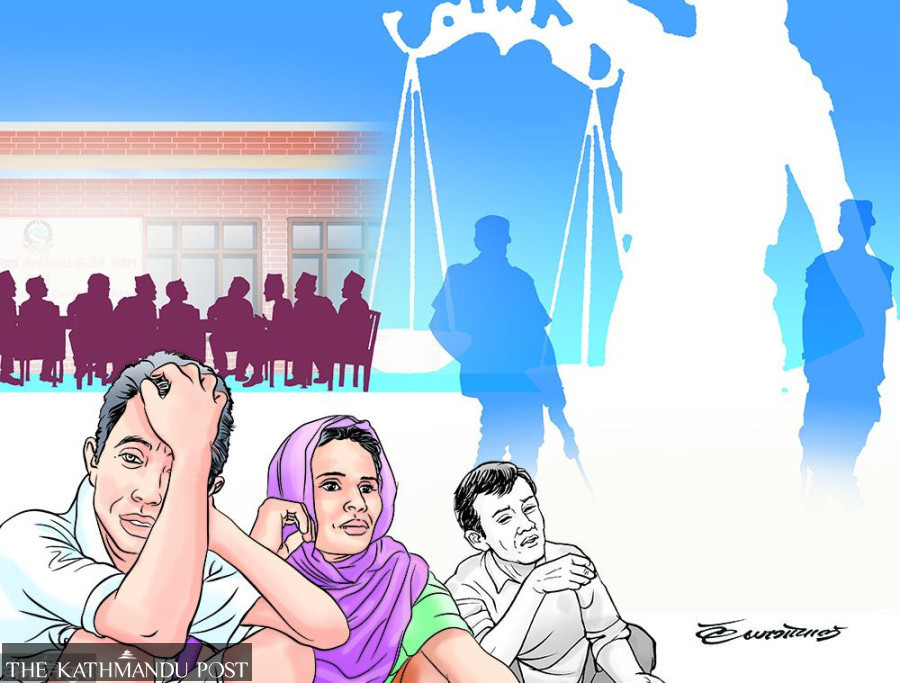National
Law revision must for transitional justice progress, victims say
Parties disagree over categorising killings, indirect victims of conflict, reduced sentencing, and reconciliation refusal.
Binod Ghimire
The victims of the decade-long Maoist insurgency have demanded amendment to the Enforced Disappearances Enquiry, Truth and Reconciliation Commission Act before the government takes any decision on the transitional justice process.
As directed by the Supreme Court, the government has started consultations with the victims to constitute temporary mechanisms within the Truth and Reconciliation Commission and the Commission of Investigation on Enforced Disappeared Persons in order to carry out preliminary investigations into the victims’ complaints.
Last week, the top court directed the government to commence the process of selecting office bearers in the two transitional justice commissions, which remain defunct for over two years.
While the selection process continues, it directed the government to constitute task forces in the transitional justice commissions, in coordination with their secretaries, to continue the investigation process.
Ten days later, the Prime Minister’s Office on Friday held a meeting with the victims seeking their feedback. “We have clearly said the amendment is a prerequisite,” Suman Adhikari, former chairman of the Conflict Victims’ Common Platform, told the Post. “If the parties come to an agreement, the bill can be endorsed within a matter of days.”
The two commissions have been inactive since July 2022 after the government decided to extend the terms of the commissions without retaining their chairmen and members. Against the government’s claim that the bill to amend the existing transitional justice law would be endorsed by October 2022, which will also open the door for recruiting new office bearers, there has been no progress.
The bill to amend the Enforced Disappearances Enquiry, Truth and Reconciliation Commission Act is under consideration in the Law, Justice and Human Rights Committee of the House of Representatives.
With no progress in the appointment of the office bearers, the victims led by Gyanendra Aran, who also is an advocate, moved the Supreme Court demanding an order to allow the officials to carry out preliminary investigations until the commissions get their chairpersons and members.
Despite their repeated commitments, the major parties have yet to reach an agreement on the bill. While the earlier ruling alliance was still intact, the Nepali Congress and the CPN (Maoist Centre) had been saying the bill should be decided through a vote if the CPN-UML refuses to agree.
Conclusion of the transitional justice process after a revision of the bill is the priority of the new alliance, as per its commitment paper released on Tuesday. On Friday, Prime Minister Pushpa Kamal Dahal and UML chair KP Sharma Oli discussed the amendment among other issues.
However, the position of the Congress is unclear after it was pushed to opposition benches. “Our position will depend on the move of the ruling parties,” said Jeevan Pariyar, deputy general secretary of the Congress party, who also is a member of the House committee.
After a year-long discussion, the parliamentary committee had whittled down the differences to four points. Differences were further narrowed on March 3 after the parties agreed to list arbitrary killings as serious violations of human rights (thus non-amnestiable), and to provide an avenue for the victims, who refuse to reconcile, to prosecute their perpetrators.
The House panel had been struggling to decide whether to categorise arbitrary killings or all killings except those that occurred in clashes as serious violations of human rights. It had also been unable to decide what happens in case the victims of human rights violations refuse to reconcile. The issues were settled after the UML showed flexibility.
Now, the parties have two main issues that need to be settled. They remain divided on how to address the concerns of those affected by the conflict even though they were not directly involved. Also, they have yet to reach consensus on the issue of reduced sentencing.
Through the order, the court has also reminded the government to immediately amend the law as per its earlier verdict. On February 26, 2015, the Supreme Court had directed the government to amend the Act’s around half a dozen provisions that allowed amnesty even in cases of serious human rights violations.
The two transitional justice bodies were formed in 2015 with a mandate to investigate and prosecute conflict-era crimes within two years. Over the years, they have undergone several term extensions, but accomplished little of their mandate.
While the truth commission has received 63,718 complaints, the disappearances commission is sitting on around 2,400 cases.




 18.12°C Kathmandu
18.12°C Kathmandu














